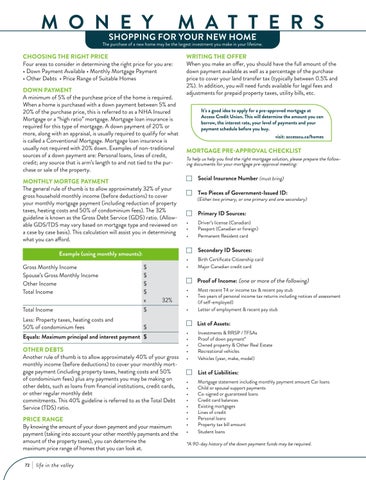M O N E Y
M A T T E R S
SHOPPING FOR YOUR NEW HOME
The purchase of a new home may be the largest investment you make in your lifetime.
CHOOSING THE RIGHT PRICE Four areas to consider in determining the right price for you are: • Down Payment Available • Monthly Mortgage Payment • Other Debts • Price Range of Suitable Homes DOWN PAYMENT A minimum of 5% of the purchase price of the home is required. When a home is purchased with a down payment between 5% and 20% of the purchase price, this is referred to as a NHA Insured Mortgage or a “high ratio” mortgage. Mortgage loan insurance is required for this type of mortgage. A down payment of 20% or more, along with an appraisal, is usually required to qualify for what is called a Conventional Mortgage. Mortgage loan insurance is usually not required with 20% down. Examples of non-traditional sources of a down payment are: Personal loans, lines of credit, credit; any source that is arm’s length to and not tied to the purchase or sale of the property. MONTHLY MORTGE PAYMENT The general rule of thumb is to allow approximately 32% of your gross household monthly income (before deductions) to cover your monthly mortgage payment (including reduction of property taxes, heating costs and 50% of condominium fees). The 32% guideline is known as the Gross Debt Service (GDS) ratio. (Allowable GDS/TDS may vary based on mortgage type and reviewed on a case by case basis). This calculation will assist you in determining what you can afford.
Gross Monthly Income Spouse’s Gross Monthly Income Other Income Total Income
$ $ $ $ x
Total Income
$
Less: Property taxes, heating costs and 50% of condominium fees
$
visit: accesscu.ca/homes
MORTGAGE PRE-APPROVAL CHECKLIST To help us help you find the right mortgage solution, please prepare the following documents for your mortgage pre-approval meeting:
Social Insurance Number (must bring) Two Pieces of Government-Issued ID:
(Either two primary, or one primary and one secondary)
Primary ID Sources: • • •
• •
Driver’s license (Canadian) Passport (Canadian or foreign) Permanent Resident card
Birth Certificate Citizenship card Major Canadian credit card
Proof of Income: (one or more of the following) 32%
Equals: Maximum principal and interest payment $ OTHER DEBTS Another rule of thumb is to allow approximately 40% of your gross monthly income (before deductions) to cover your monthly mortgage payment (including property taxes, heating costs and 50% of condominium fees) plus any payments you may be making on other debts, such as loans from financial institutions, credit cards, or other regular monthly debt commitments. This 40% guideline is referred to as the Total Debt Service (TDS) ratio. PRICE RANGE By knowing the amount of your down payment and your maximum payment (taking into account your other monthly payments and the amount of the property taxes), you can determine the maximum price range of homes that you can look at. life in the valley
It’s a good idea to apply for a pre-approved mortgage at Access Credit Union. This will determine the amount you can borrow, the interest rate, your level of payments and your payment schedule before you buy.
Secondary ID Sources:
Example (using monthly amounts):
72
WRITING THE OFFER When you make an offer, you should have the full amount of the down payment available as well as a percentage of the purchase price to cover your land transfer tax (typically between 0.5% and 2%). In addition, you will need funds available for legal fees and adjustments for prepaid property taxes, utility bills, etc.
• • •
Most recent T4 or income tax & recent pay stub Two years of personal income tax returns including notices of assessment (if self-employed) Letter of employment & recent pay stub
List of Assets: • • • • •
Investments & RRSP / TFSAs Proof of down payment* Owned property & Other Real Estate Recreational vehicles Vehicles (year, make, model)
List of Liabilities: • • • • • • • • •
Mortgage statement including monthly payment amount Car loans Child or spousal support payments Co-signed or guaranteed loans Credit card balances Existing mortgages Lines of credit Personal loans Property tax bill amount Student loans
*A 90-day history of the down payment funds may be required.
